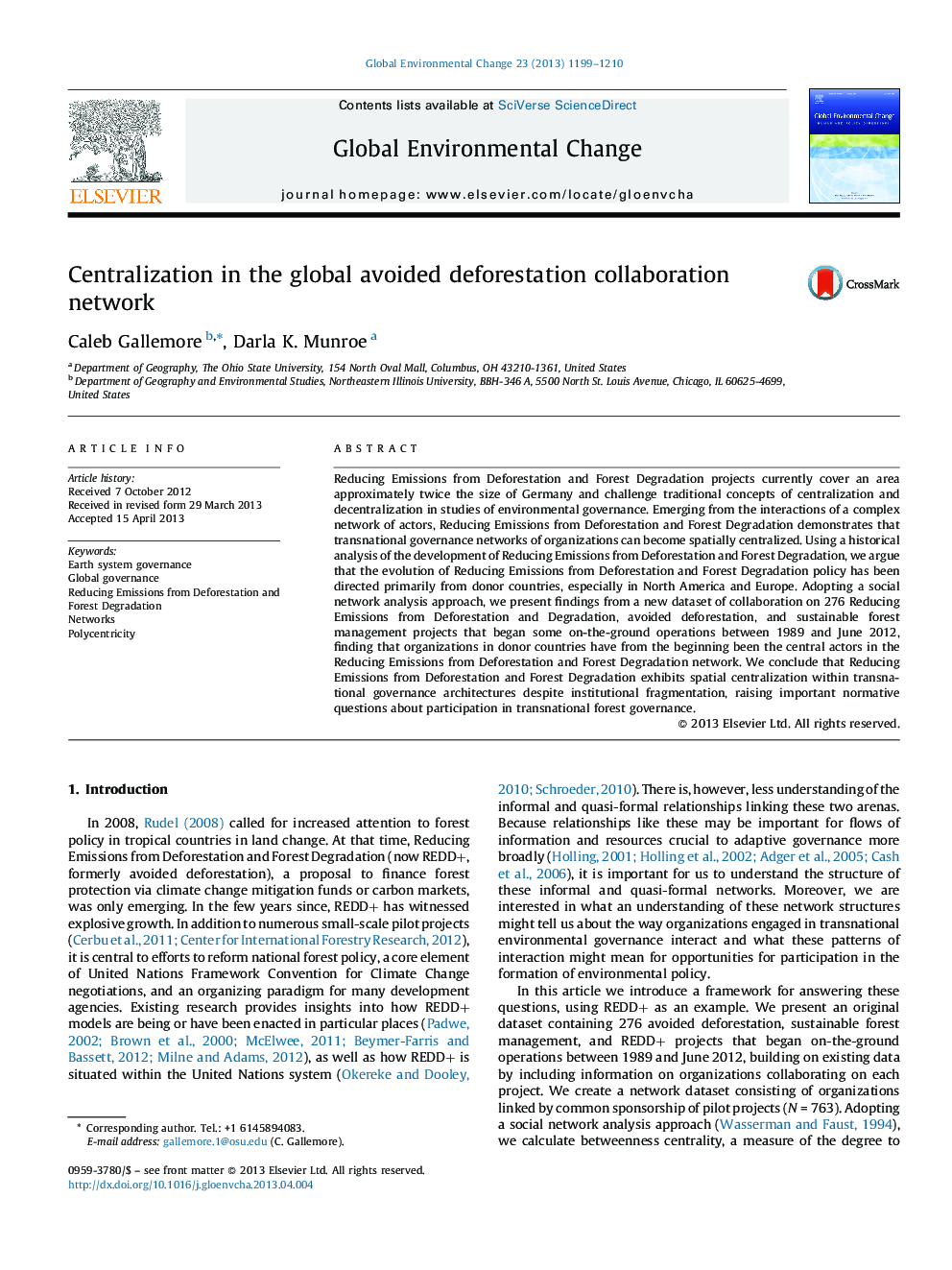| کد مقاله | کد نشریه | سال انتشار | مقاله انگلیسی | نسخه تمام متن |
|---|---|---|---|---|
| 10505110 | 946854 | 2013 | 12 صفحه PDF | دانلود رایگان |
عنوان انگلیسی مقاله ISI
Centralization in the global avoided deforestation collaboration network
ترجمه فارسی عنوان
مرکزی سازی در سراسر جهان اجتناب از شبکه های همکاری در جنگل زدایی
دانلود مقاله + سفارش ترجمه
دانلود مقاله ISI انگلیسی
رایگان برای ایرانیان
کلمات کلیدی
حکومت سیستم زمین، حکومت جهانی، کاهش انتشار ناشی از جنگل زدایی و تجزیه جنگل، شبکه های، چندرسانه ای،
ترجمه چکیده
در حال حاضر پروژه کاهش انتشار گازهای گلخانه ای از جنگل زدایی و جنگلزدایی های جنگل تقریبا برابر دو برابر آلمان است و به بررسی مفاهیم سنتی تمرکز و عدم تمرکز در مطالعات حکومتداری محیط زیست می پردازد. در حال افزایش از تعاملات یک شبکه پیچیده بازیگران، کاهش انتشار ناشی از جنگل زدایی و تجزیه جنگل نشان می دهد که شبکه های حکومتی فراملی سازمان ها می توانند فضایی متمرکز شوند. با استفاده از یک تحلیل تاریخی از توسعه کاهش میزان انتشار از جنگل زدایی و تجزیه جنگل، ما استدلال می کنیم که تکامل کاهش انتشار از سیاست های جنگلزدایی و جنگلزدایی در درجه اول از کشورهای کمک کننده، به ویژه در آمریکای شمالی و اروپا هدایت شده است. با اتخاذ یک رویکرد تحلیل شبکه اجتماعی، یافته های ما از مجموعه داده جدیدی از همکاری در 276 کاهش انتشار از جنگل زدایی و تجزیه، جلوگیری از جنگل زدایی و پروژه های مدیریت پایدار جنگل که برخی از عملیات های زمینی را بین سال های 1989 تا ژوئن 2012 شروع کردند، سازمان های کشورهای کمک کننده از همان ابتدا بازیگران اصلی در کاهش انتشار ناشی از جنگل زدایی و شبکه های تخریب جنگل بوده اند. ما نتیجه می گیریم که کاهش نشر معادن از جنگل زدایی و تجزیه جنگل نشان می دهد تمرکز فضایی در معماری های حکومتی فراملیتی با وجود شکاف های سازمانی، سوالات مهم هنجاری در مورد مشارکت در حکومتداری جنگل های فراملی.
موضوعات مرتبط
علوم زیستی و بیوفناوری
علوم محیط زیست
علوم زیست محیطی (عمومی)
چکیده انگلیسی
Reducing Emissions from Deforestation and Forest Degradation projects currently cover an area approximately twice the size of Germany and challenge traditional concepts of centralization and decentralization in studies of environmental governance. Emerging from the interactions of a complex network of actors, Reducing Emissions from Deforestation and Forest Degradation demonstrates that transnational governance networks of organizations can become spatially centralized. Using a historical analysis of the development of Reducing Emissions from Deforestation and Forest Degradation, we argue that the evolution of Reducing Emissions from Deforestation and Forest Degradation policy has been directed primarily from donor countries, especially in North America and Europe. Adopting a social network analysis approach, we present findings from a new dataset of collaboration on 276 Reducing Emissions from Deforestation and Degradation, avoided deforestation, and sustainable forest management projects that began some on-the-ground operations between 1989 and June 2012, finding that organizations in donor countries have from the beginning been the central actors in the Reducing Emissions from Deforestation and Forest Degradation network. We conclude that Reducing Emissions from Deforestation and Forest Degradation exhibits spatial centralization within transnational governance architectures despite institutional fragmentation, raising important normative questions about participation in transnational forest governance.
ناشر
Database: Elsevier - ScienceDirect (ساینس دایرکت)
Journal: Global Environmental Change - Volume 23, Issue 5, October 2013, Pages 1199-1210
Journal: Global Environmental Change - Volume 23, Issue 5, October 2013, Pages 1199-1210
نویسندگان
Caleb Gallemore, Darla K. Munroe,
